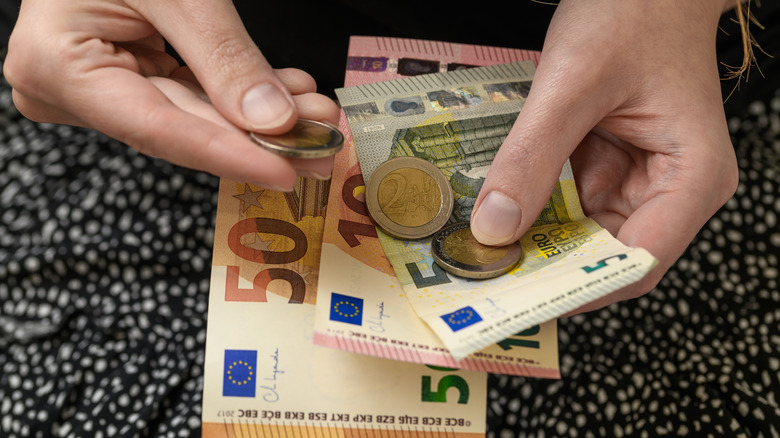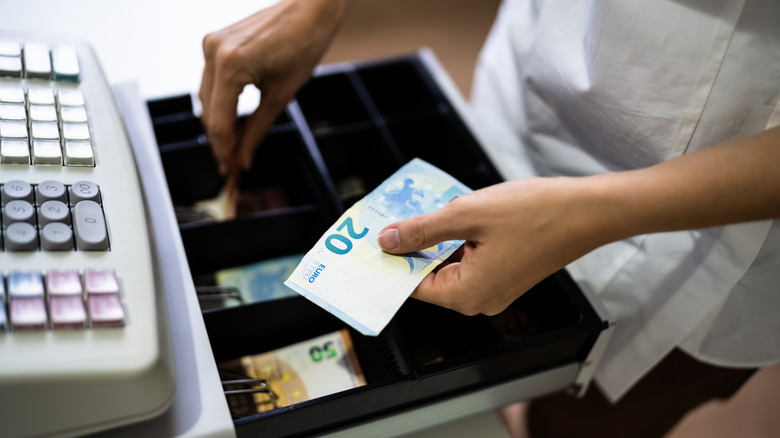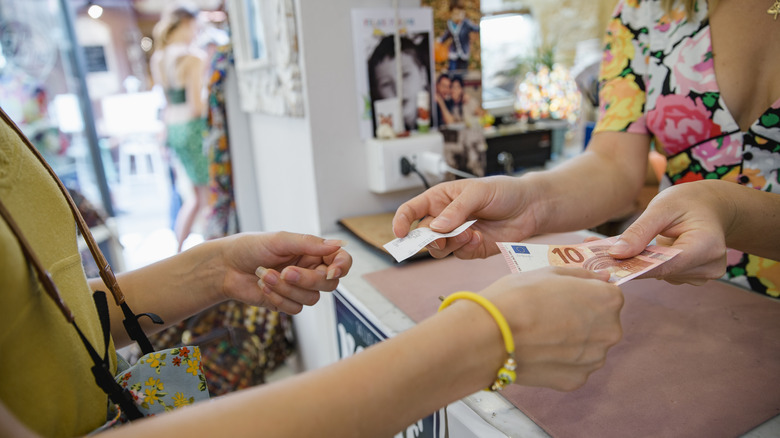The Common Cashier Scam Rick Steves Wants Tourists To Be Aware Of When Paying With Cash
As the saying goes, time is money, and you've got to make the most of what you've got, even when traveling. You have a train to catch in 45 minutes, but want to pick up a snack from the store before making your way to the station since you have more than enough time...for now. As you pay for your items, you're constantly checking your watch while time is ticking. The clerk is counting your change abnormally slow, and now you've got 10 minutes until your train. Well, according to savvy travel guru Rick Steves, this "slow cash counting" method is actually a common cashier scam.
While traveling, it's important to be vigilant and aware of your surroundings. Things like knowing how to avoid getting scammed by fake tourist guides on your next trip make all the difference, as a lack of awareness could turn your vacation from an enjoyable one to a sour experience. In a post about travel scams on Steves' blog, he mentions just how creative scammers are. "Many of the most successful gambits require a naive and trusting tourist. But it can happen to more sophisticated travelers, too." Even in a professional establishment with a cashier, foreign tourists may be too trusting when it comes to handing over their cash in hopes that the cashier is an honest employee and will return the correct amount. However, this isn't always the case, unfortunately, with the speed at which you get your change being a potential red flag.
Rick Steves' warning about the slow cash counting scam
There are plenty of old-school travel tips that are timeless for a fool-proof getaway, such as using cash, since it still reigns supreme across many European countries. But in Rick Steves' post, he mentions how tourists are typically in a rush and not paying close attention when making purchases or exchanging currency. "Cashiers who deal with lots of tourists thrive on the slow count. They'll count your change back with odd pauses in hopes that the rushed tourist will gather up the money early and say 'Grazie'."
If you've ever stood in line while waiting for a cashier to count out your change while you're in a hurry, then you'll certainly be familiar with what Steves is talking about. This somewhat innocent way of dishing out a customer's change may not seem like a scam at first, but it can add up, unlike your return change. While Steves advises readers to use a mobile app as a means of paying, some establishments do only accept cash, which is fine; just be careful and pay attention. If you notice your cashier counting abysmally slow or getting distracted, that's when you should keep a sharp eye. If possible, try to pay with smaller cash notes or even exact change to avoid the awkward encounter altogether. If they expect you to wait for your change, then they can wait for you to count out the exact amount.
Other scams tourists need to be aware of when using cash
Unlike locals, tourists are often unfamiliar with foreign currency, whether it be in looks, value, or color. We've all been there at some point during our travels. As you're about to pay, you open your hand full of coins and look at them in complete bewilderment. The cashier thumbs through your coins to help, as you blindly trust them to select the right amount. While not every cashier will scam tourists, you should familiarize yourself with the currency before traveling to avoid being shortchanged.
"In restaurants, in stores, at ticket booths, everywhere," Rick Steves notes, referencing just how important it is to be alert anywhere cash changes hands. In some instances, Steves warns tourists to be aware of chatty cashiers that are on their phones while ringing you through, especially with your credit card, as they may be taking a sneaky photo of your card details. He advises tourists to "consider paying cash for smaller purchases" while staying aware of slow counting and other cash-related tricks.
Another money-making scheme for crafty scammers is to do what Steves calls the "Switcheroo — You Lose." When you're traveling, sometimes you only have larger denomination bills, which could hurt your wallet after a purchase or a taxi ride to your hotel. Taxi drivers are receiving tons of heat for ripping off tourists with scams like this. Steves educates his readers by explaining that "some cabbies or servers will pretend to drop a large bill and pick up a hidden small one in order to shortchange a tourist." So, whether you're buying a snack or a souvenir at the corner stall, every coin you count is one step toward making you feel safer when traveling and having a smoother, smarter, and more enjoyable adventure.


